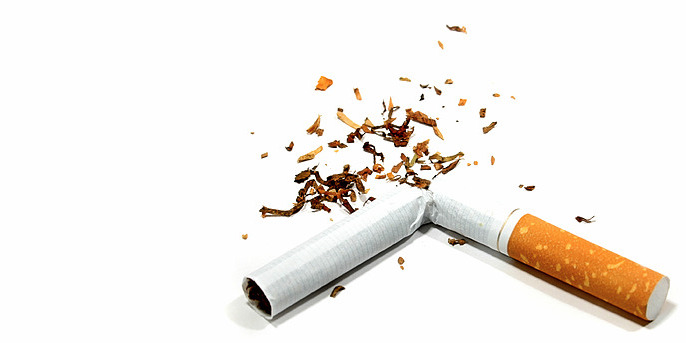When you first stop smoking, your body and your mind take time to adjust. Consequently, cravings and other withdrawal symptoms can occur, usually peaking in the first few days after you quit and lasting for a few weeks beyond that. Here’s what you can expect—and what you can do.
- Cravings.Cravings usually peak during the first few days after quitting smoking. You have three options that you can use alone or in combination: (1) wait out the craving (they only last a few minutes), (2) reduce the craving (breathe deeply and slowly and/or use a nicotine replacement product), or (3) distract yourself (get active, focus on work, run an errand, etc.).
- Headaches, nervousness or irritability.Remind yourself to stay calm and use relaxation techniques (e.g. deep breathing). Drink lots of water and juice to flush the nicotine and other by-products of smoking out of your body faster. If your headache gets too bad try a mild painkiller. Cut your caffeine intake by at least half (caffeine is absorbed much faster when you are a smoker so when you quit smoking, that same amount of caffeine can feel much too strong).
- Cough, dry throat or nasal drip.In order to clear your breathing passages, your body starts ridding itself of mucus. Drink plenty of fluids, use lozenges, chew sugar-free gum.
- Constipation, gas.Your intestinal movement may slow for a brief period after quitting smoking. Drink plenty of fluids, add more fibre to your diet (fruits, vegetables, whole-grains) and exercise regularly.
- Low mood.Do activities you enjoy, talk to friends and family. If your low mood persists or becomes troublesome, visit your doctor.
- Difficulty concentrating.Plan your workload and commitments accordingly and avoid additional stress during the first few weeks after quitting.
- Dizziness.As your lungs become healthier, they will be more efficient at moving oxygen into your bloodstream which can cause a few seconds of dizziness once or twice a day for a few days. Change positions slowly and sit or lie down until the dizziness subsides.
- Fatigue, tiredness.Nicotine is a stimulant. Without it, you can feel tired until your body adjusts. Nap as needed, don’t push yourself too hard, and consider trying a nicotine replacement product.
- Hunger.Cravings can be confused with hunger. Drink water and low-calorie fluids. Have low-calorie snacks available.
- Insomnia or disrupted sleep.Nicotine can influence your sleep pattern so when you quit smoking your sleep patterns needs to adjust once again. Limit caffeine intake, use relaxation techniques to help you sleep, do not exercise or have a big meal within a few hours of going to bed, and stick to a regular sleep/wake schedule (including weekends).
Quit Smoking Resources
The following is a list of helplines and resources. New resources are continually available, and the contact information for some of these resources may change. For the most up-to-date information, do an internet search for “quit smoking programs.”
Provincial Smokers’ Helplines
- British Columbia (1.877.455.2233)
- Yukon (1.866.221.8393)
- Nunavut (1.866.877.3845)
- Northwest Territories (1.867.920.8826)
- Alberta (1.866.332-2322 and alberta.quitnet.com)
- Saskatchewan, Manitoba, Ontario, New Brunswick, Nova Scotia (1.877.513.5333)
- Prince Edward Island (1.888.818.6300)
- Quebec (1.866.527.7383)
- Newfoundland, Labrador (1.800.363.5864)
Resources For Youths
- Quit4Life (www.quit4life.ca) is a Health Canada program for 12 to 18 year olds.
- Smoke-FX (www.smoke-fx.com) is Ontario-based and has many useful resources to aid in quitting smoking as well as an advocacy tool kit.
- Smoking Zine (www.smokingzine.org) is a University of Toronto smoking cessation program for teens.
Other Resources
- Inventory of Canadian Tobacco Cessation Programs and Resources (http://www.hc-sc.gc.ca/hl-vs/pubs/tobac-tabac/ictcpr-rrpcrt/index-eng.php). A listing of smoking cessation programs that are available nation-wide or province-wide.
- Health Canada (http://www.hc-sc.gc.ca). Health Canada has numerous resources to help smokers quit. Search the “It’s your health” section of the Health Canada site or use the A-Z index to find out about the latest programs and information they offer.
- Canadian Cancer Society (www.cancer.ca or 1.888.939.3333)
- Canadian Lung Association (www.lung.ca)
- Heart and Stroke Foundation of Canada
- (www.heartandstroke.ca)
- National Clearinghouse on Tobacco and Health
- (www.ncth.ca/NCHweb.nsf)
- Non-smoker’s right association (www.nsra-adnf.ca)
- Physicians for a smoke-free Canada (www.smoke-free.ca)
- Conseil québécois sur le tabac et la santé (www.cqts.qc.ca)













